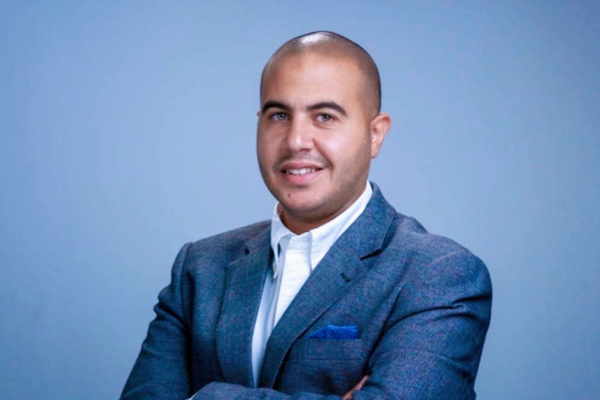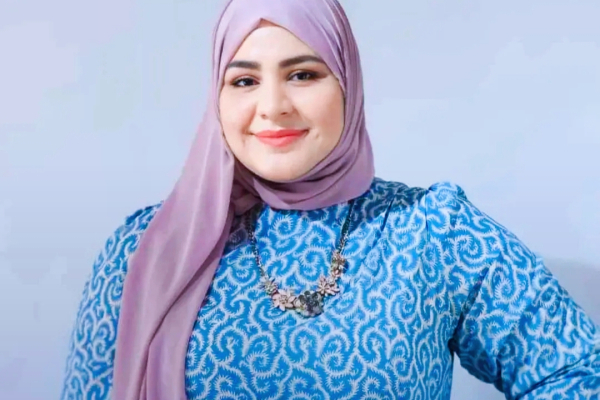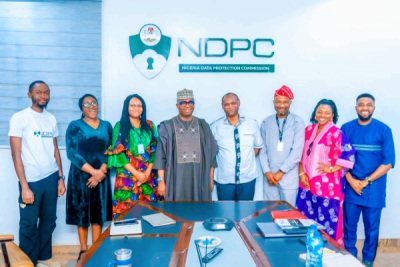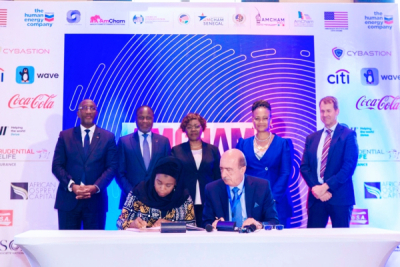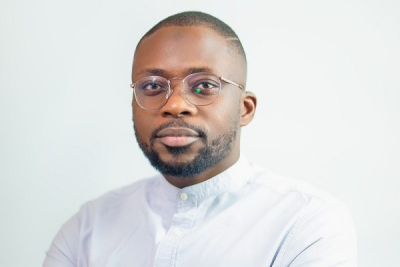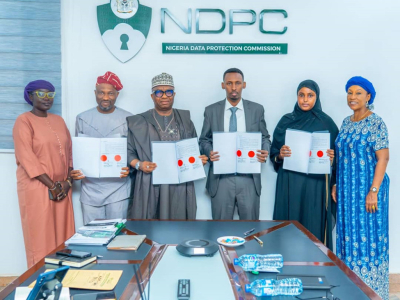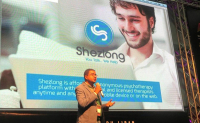He rethinks the customer experience with a bold digital solution. Driven by a practical and connected vision, he transforms waiting habits into a smooth and intelligent journey.
Maged Negm, an Egyptian tech entrepreneur with a background in electronics engineering and marketing, is the co-founder and chief executive officer of Qme, a startup providing an intelligent virtual queue solution.
Founded in 2022, Qme aims to alleviate waiting times in businesses, institutions, and organizations. This digital solution allows customers to join a queue remotely without the need for immediate physical presence. Using their smartphones, customers can select a service provider or partner, choose a service, locate the most convenient branch, and obtain a virtual ticket with just a few taps.
The platform, driven by artificial intelligence, automatically assigns tickets based on the customers' location and the number of people at various branches, with the goal of minimizing waiting times. Users also receive personalized alerts regarding their position and the queue status, enhancing service management efficiency and improving the overall customer experience.
Negm earned a bachelor's degree in electronics and communication engineering in 2008 from the Modern Sciences and Arts University in Egypt. In the following year, he joined Fawry Banking and Payment Technology Services as a business development specialist.
In December 2009, Negm moved to Orange Egypt. He initially worked within the pre-sales team for business solutions before advancing to the role of senior product marketing supervisor. From 2018 to 2021, he served as product marketing manager at Cequens, a provider of omnichannel communication solutions.
By Melchior Koba,
Editing by Sèna D. B. de Sodji
She is committed to providing tailored support for mental health, particularly for people with neurodevelopmental disorders. Her innovative approach has earned her several awards.
Abid Khouloud, a Tunisian entrepreneur and ardent mental health advocate, is the co-founder and chief executive officer of AUZY Mental Health, a startup leveraging artificial intelligence to transform mental healthcare.
Founded in 2021, AUZY Mental Health is a medical technology startup providing a comprehensive medico-psycho-social support platform. This platform offers tailored care for children with neurological development disorders, encompassing information, detection, diagnosis, treatment, and support services.
AUZY aims to provide access to expert therapists and facilitate early screening. The company's core mission is to empower every child to become an active member of society and benefit from all means of decent living. We work to ensure guidance, coordination, and an early intervention process for children with neurodevelopmental disorders.
Prior to establishing AUZY, Khouloud co-founded Elfallega in 2020, a company specializing in outdoor activities for individuals and professionals. She served as the communications manager there until 2023.
Khouloud earned a computer engineering degree in 2023 from the Higher Institute of Computer Science and Communication Technologies (ISITCom) in Tunisia. She also holds a master’s degree in systems, services, and applications in the Internet of Things from the National School of Engineers of Sousse, obtained in 2020.
Her professional journey began in 2020 as a full-stack engineer for the Rassemblement des ingénieurs francophones (RIF) in France. In 2022, she joined Bigweb Agency, a digital marketing firm, where she was responsible for the program management office.
Khouloud is a recipient of the Orange Social Venture Prize in Africa and the Middle East (POESAM) 2024 in Tunisia. Her startup also secured third place in the Tunisia E-Health Valley competition, which recognizes companies offering digital solutions for the pharmaceutical, health, and wellness sectors.
By Melchior Koba,
Editing by Sèna D. B. de Sodji
-
Delegations from Zambia and Zimbabwe visited the Nigerian Data Protection Commission (NDPC) to study its practices, aiming to replicate Nigeria's successful model.
-
Key focus areas included the public-private partnership model, human capital development, policy creation, and public awareness, as highlighted by NDPC Commissioner Vincent Olatunji.
-
The visit follows a growing need for robust data protection amid digital transformation, as noted by Yellow Card, while challenges persist in adapting the model to differing local contexts.
Zambia and Zimbabwe are looking to Nigeria for guidance in personal data protection, with separate delegations from the two Southern African nations making a working visit this week to the headquarters of the Nigerian Data Protection Commission (NDPC). The meetings took place on the sidelines of the General Assembly of the African Network of Personal Data Protection Authorities (RAPDP) held in Abuja, Nigeria.
"The purpose of the visit was for the delegations to understudy the day-to-day operations of the NDPC, with a view to replicating best practices in their respective countries," the NDPC said in a statement released on Wednesday, May 14.
Vincent Olatunji, the National Commissioner of the NDPC, provided the visiting delegations with an overview of the development of data protection in Nigeria. He emphasized that the Commission has developed a strategic roadmap that has served as its guide since the enactment of the Nigeria Data Protection Act of 2023. Olatunji highlighted the public-private partnership model as a key driver of the institution's success. Discussions also covered crucial areas such as human capital development, public awareness campaigns, policy formulation, and collaborative strategies.
This benchmarking visit occurs against a backdrop of rapid digital transformation and the widespread use of electronic communication services. "As more African countries go digital, protecting personal data and ensuring privacy has become a critical concern. People, businesses, and governments are increasingly aware of the need to safeguard personal information as the world becomes more interconnected," noted the cryptocurrency exchange platform Yellow Card in its 2025 report, "The State of Data Protection Laws in Africa."
This knowledge exchange could empower the data protection authorities of Zambia and Zimbabwe to enhance their capacity to fully execute their responsibilities, which, according to Yellow Card, include enforcing legislation, investigating breaches, and assisting businesses and citizens in adopting best practices. For instance, a joint 38-month investigation by Nigeria's Federal Competition and Consumer Protection Commission (FCCPC) and the NDPC found that WhatsApp had violated Nigerian data protection and competition laws, resulting in a $220 million fine imposed on its parent company, Meta, in July 2024.
However, replicating the Nigerian model in Zambia and Zimbabwe could present challenges due to differing national contexts. Furthermore, Yellow Card points out that the effectiveness of data protection authorities across the African continent varies due to disparities in resources, expertise, and political commitment.
By Isaac K. Kassouwi,
Editing by Sèna D. B. de Sodji
-
The U.S. announced over $550 million in trade agreements with Côte d’Ivoire, focusing on energy, digital transition, infrastructure, security, housing, and technology.
-
Key partnerships include George Mason University, Cybastion, and the Ivorian Ministry of Digital Economy to train youth in AI and cybersecurity, alongside Cybastion’s ongoing projects in West Africa.
-
These initiatives aim to strengthen Côte d’Ivoire’s digital sovereignty, secure critical infrastructures, and develop local digital talent.
The United States is deepening its engagement in Côte d’Ivoire's digital transformation, with a senior State Department official announcing and witnessing the signing of over $550 million in trade agreements during a recent visit to Abidjan. Troy Fitrell,acting Assistant Secretary for African Affairs , participated in key economic meetings where the deals spanned crucial sectors including energy, digital transition, infrastructure, security, housing, and technology.
A significant focus of the U.S. commitment lies in the information and communication technology (ICT) sector. Several initiatives were spotlighted, notably a memorandum of understanding between George Mason University, U.S. firm Cybastion, and the Ivorian Ministry of Digital Economy. This collaboration aims to cultivate young talent in artificial intelligence and cybersecurity, providing Ivorian youth with the skills necessary to navigate the demands of the digital economy.
Adding to this momentum, Cybastion, an American company, has pledged to develop projects across several West African nations, with a particular emphasis on cybersecurity, e-government solutions, connectivity enhancement, and technology-focused training programs.
This fresh wave of commitment builds upon existing cooperation between Côte d’Ivoire and Cybastion. In 2023, the cybersecurity firm inked an agreement with Ivorian authorities for the development of a national data center and a digital administrative city. Further bolstering digital skills, a partnership with Cisco was launched in 2024 to train 3,000 women in various digital competencies.
The overarching ambition of these initiatives is to foster a more robust regional digital ecosystem. For Côte d’Ivoire, the key challenge lies in effectively leveraging these partnerships to fortify its digital sovereignty, establish secure critical infrastructure, and cultivate a substantial pool of skilled individuals capable of meeting the expanding needs of the digital sector, moving beyond isolated pilot programs.
By Samira Njoya,
Editing by Sèna D. B. de Sodji
What makes him stand out is how he revamps old-school industries. He brings together smart planning, digital know-how, and a drive to solve everyday issues with practical solutions.
Ibraheem Babalola, a Nigerian technology entrepreneur, is the co-founder and chief executive officer of ETAP, a car insurance application developed to streamline the process of buying and managing insurance policies.
Launched in 2022, ETAP is a digital platform that enables users to manage all their car insurance policies in one place. The application monitors driving patterns, identifies potential hazards, implements cost-saving strategies, and assists users in making informed decisions to extend vehicle lifespan and optimize usage.
Leveraging technology, ETAP transforms vehicle movements into driving scores, which incentivize safer road behaviors. The application pinpoints areas for improvement and rewards top-rated drivers to promote proper car maintenance. To date, over 5,000 businesses and individuals use its services.
Prior to establishing ETAP, Babalola co-founded Muster in 2017, a shared housing platform across Africa. He served as its CEO until 2020, where he directed business development, growth initiatives, expansion efforts, and overall strategy.
Babalola holds a bachelor's degree in Information Systems from the American University of Nigeria. He also obtained a master's degree in International Political Economy from Leeds Beckett University in England.
His professional journey began in 2012 in the Human Resources division of GTBank in Nigeria. In 2013, he joined Forte Oil Nigeria, working within the banking operations and international investments department. The following year, he served as a financial services representative at Leeds Beckett University. In 2016, he became an investment analyst at Afrinvest West Africa. From 2020 to 2022, he held the position of CEO at Clane, a Nigerian fintech company.
By Melchior Koba
Editing by Sèna D. B. de Sodji
For developing nations, especially in Africa, embracing strong data protection is not only about catching up with global standards—it is about shaping a sovereign, secure, and inclusive digital future.
The Nigeria Data Protection Commission (NDPC) and the Data Protection Authority (DPA) of Somalia have signed a Memorandum of Understanding (MoU) aimed at enhancing cross-border collaboration on data protection and privacy enforcement. The signing followed the successful hosting of the 2025 edition of the Network of African Data Protection Authorities (NADPA-RAPDP) Conference and Annual General Meeting by the NDPC in Abuja, from 6-8 May, which drew participation from several African data protection authorities.
The agreement was signed by the National Commissioner/CEO of the NDPC, Dr. Vincent Olatunji, and the Director-General of DPA Somalia, Mr. Mohamed Nur Ali, at the NDPC headquarters in Abuja. The MoU outlines key areas of cooperation, including mutual legal assistance, information sharing, and joint efforts to promote compliance with data protection laws.
Delegations from The Gambia and Somalia had remained in Nigeria after the conference to study the NDPC’s operational model and strategic approach, which has earned the Commission growing recognition within the global data protection ecosystem.
Africa is undergoing rapid digitalization, but cross-border cooperation on data protection remains weak. Data protection is essential for preserving individual dignity and rights, building digital trust necessary for economic participation, enabling cross-border trade and innovation, strengthening national security and regulatory capacity, and guiding the ethical deployment of emerging technologies.
As of now, only 36 out of 55 African countries have enacted data protection laws, according to data from Data Protection Africa. Without cooperation agreements like this MoU, enforcement across borders becomes fragmented, making Africa vulnerable to data misuse, cybercrime, and privacy breaches. Formalizing cooperation between Nigeria and Somalia sets a precedent for other African nations to follow, helping to secure citizens’ data rights, strengthen national institutions, and create a more trustworthy digital environment for innovation and trade.
Hikmatu Bilali
He represents a new wave of African entrepreneurs dedicated to the continent's digital and social advancement. Working at the intersection of technology, finance, and social impact, he develops innovative solutions to empower the informal economy.
Brian Makwaiba, a South African technology entrepreneur, is the co-founder and chief executive officer of Vuleka, a platform that integrates e-commerce and financial technology services.
Established in 2017, Vuleka connects manufacturers and wholesalers with small store owners, enabling these store owners to sell their products directly to consumers. The platform manages the collection of goods from suppliers and ensures their delivery to retailers.
Vuleka also provides a secure payment solution and develops credit profiles for informal entrepreneurs who lack traditional banking access, thereby facilitating their access to financing. Through its buy-now-pay-later system, it assists micro, small, and medium-sized merchants in optimizing their cash flow and securing their supply chain.
In addition to Vuleka, Makwaiba operates All Data, a firm specializing in the collection, cleaning, analysis, and interpretation of data from the informal sector. He also heads Multi Media Villa, a consulting company, and leads CIBIO, a technology venture focused on agriculture. Furthermore, he serves as Vice President of the Johannesburg Chamber of Commerce and Industry in South Africa.
As an active investor, Makwaiba supports Lucre, a startup microcredit fund. He also chairs the board of ASANDE Investments, a social enterprise addressing critical issues facing South African society.
Makwaiba earned a Bachelor of Medicine degree from Stellenbosch University in 2005. In 2015, he pursued entrepreneurial studies at the University of Pretoria. He further obtained a Master of Commerce degree from the Stellenbosch Business School in 2020.
Between 2012 and 2022, Makwaiba served as a director at IAM Emerge, a South African creative agency. More recently, in 2023 and 2024, he worked as a business coach at Old Mutual South Africa, a financial services company, and subsequently at alx_africa, an online training platform.
By Melchior Koba
Editing by Sèna D. B. de Sodji
In African societies where mental health often remains a taboo subject, Egyptian entrepreneur Ahmed Abu Elhaz has developed a solution aimed at providing confidential assistance to individuals grappling with a range of conditions, from mood disorders to addictions.
Shezlong, an e-health platform developed by an Egyptian startup, provides users with confidential consultations with certified psychologists via videoconference. Founded in Cairo in 2014 by Ahmed Abu Elhaz (photo), the startup offers a discreet avenue for mental health support.
The platform features a mobile application, available on both iOS and Android, where it has been downloaded over 50,000 times according to the Play Store. After creating an account, users can connect with more than 350 mental health professionals proficient in multiple languages, including Arabic, English, and French. Shezlong tailors its services to the specific needs of each individual, addressing concerns such as anxiety, depression, trauma, and offering personal coaching.
Shezlong recently broadened its services with the introduction of Sukun, an AI-powered therapeutic assistant available in both Arabic and English. This tool allows users to interact with a conversational agent trained to offer immediate psychological support while directing them toward appropriate therapy when necessary.
"We believe the human element is at the core of the therapeutic journey for our clients. This innovation gives our therapists superpowers to enhance the experience for both therapists and clients," said Professor Mohamed Elsheikh, Chief Medical Officer at Shezlong.
Leveraging AI, the health technology company aims to address the increasing demand for mental health services. Since its inception, Shezlong has successfully secured several funding rounds to support its expansion across Africa and the Middle East.
Adoni Conrad Quenum
As digital technology reshapes everyday life, new initiatives are emerging to meet people's daily needs. Fueled by an innovative vision, one entrepreneur is steadily becoming a key player in this transformation.
Vianney Kanda (photo), a Central African expert in corporate finance and a technology entrepreneur, is the founder and chief executive officer of Warani, a startup specializing in the development of digital solutions.
Founded in 2022, Warani designs digital tools across various sectors. A key achievement is Warani Food, a mobile application for ordering and delivering meals to homes. This platform allows restaurant owners to present their menus to customers, who can track the delivery person's real-time location once their order is confirmed.
Another innovation from Warani is Warani Shop, a go-to platform for online shopping and rapid product delivery. The company also operates in the real estate sector with the Wara application, which assists users in buying property, making it profitable, or building their homes. Additionally, Warani Hébergement enables users to book accommodations, including hotels, villas, and trips within the Central African Republic.
"The idea behind Warani is not just to promote services to Central Africans but also to make traditionally sold products more accessible and to offer so-called digital solutions, with the aim of contributing to the economic structure. That’s why we decided to launch this startup," explained Vianney Kanda, Warani's founder.
In terms of his education, Vianney Kanda earned a bachelor's degree in finance and financial services management from the Université Centrale de Tunisie in 2015. He subsequently obtained a master's degree in wealth management, finance, and financial services from MBA ESG in Paris in 2018, followed by a master's degree in corporate finance, mergers, and acquisitions from the same institution in 2021.
His professional career began in Spain in 2017 at the Borja Center, a Jesuit community, where he served as a financial management officer. Between 2019 and 2021, he held the position of financial analysis and reporting manager at Optima Finances, a company based in France.
By Melchior Koba,
Editing by Sèna D. B. de Sodji
- The Senegalese Data Protection Commission (CDP) partnered with the Pan-African NGO Paradigm Initiative (PIN) to enhance digital education, privacy protection, and awareness in Africa.
- The collaboration will involve joint awareness campaigns, capacity-building workshops, and training for public institutions, private sector actors, and civil society.
- The partnership addresses challenges in Senegal's data protection culture and aligns with regional efforts to improve digital rights and security.
Senegal's Commission for the Protection of Personal Data (CDP) announced Monday a strategic memorandum of understanding with the Pan-African non-governmental organization Paradigm Initiative (PIN), on the sidelines of the African Network of Personal Data Protection Authorities (RAPDP) General Assembly in Abuja. The partnership aims to strengthen awareness, digital education, and privacy protection amid the continent's rapid digital transformation.
"The government, the private sector, civil society, and the media must collaborate so that we can make the most of the digital economy. We cannot continue to talk about the digital economy without protecting it," said Gbenga Sesan (photo, center), the executive director of the NGO.
The collaboration will involve joint awareness campaigns, including information drives, capacity-building workshops, and training sessions targeting public institutions, the private sector, and civil society. The overarching goal is to embed a culture of data protection at both the national and sub-regional levels.
PIN, which operates in six African nations – Cameroon, Nigeria, Kenya, Senegal, Zambia, and Zimbabwe – brings its expertise in advocating for digital rights to this partnership. The NGO also operates an online platform where individuals can report instances of abuse or unauthorized use of their personal data.
In Senegal, this collaboration coincides with the increasing digitization of public and private services, a trend supported by national policies aimed at leveraging digital technology for development. However, a robust data protection culture has yet to fully develop. While Law No. 2008-12 on personal data provides a legal framework, its full implementation is hindered by a lack of technical resources, training, and awareness within institutions and among the general public. Despite its active role, the CDP faces challenges in addressing all issues arising from the proliferation of digital platforms and the massive collection of data.
Across the African continent, the state of data protection is varied. According to the 2025 Yellow Card report, 39 of the 55 African countries now have personal data protection legislation in place. However, the enforcement of these laws differs significantly. While some nations, such as Morocco, South Africa, and Kenya, have active and well-structured regulatory authorities, others lack the necessary human and financial resources or independence, limiting their capacity to act effectively. Furthermore, the ratification of the Malabo Convention on cybersecurity and data protection, which entered into force in 2023, represents notable progress, although its implementation remains inconsistent.
Given these shared challenges, regional collaborations, such as the partnership between the Senegalese CDP and Paradigm Initiative, are seen as crucial for pooling resources, harmonizing practices, and fostering a digital environment that is safe, inclusive, and respectful of rights.
By Samira Njoya,
Editing by Sèna D. B. de Sodji
More...
He is among the African entrepreneurs of his generation who leverage technology to solve real-world problems. With an inclusive approach, he is using innovation to improve education.
Blaise-Antoine Lauboue (photo), an Ivorian entrepreneur with a focus on technology and digital transformation, is the founder, chief executive officer, and chief operating officer of Le Badjôr, a startup centered on educational technologies.
Established in 2024, Le Badjôr has developed an application designed to make collaborative and engaging learning accessible to all. The company's mission is to cultivate a stimulating environment where students can review material daily throughout their academic careers, whether in school or university. A key feature of the application, "Mon Gbonhi," enables users to form communities for knowledge sharing.
The application uses a question-and-answer system enhanced by a voting mechanism, fostering more dynamic and interactive exchanges. It also incorporates a points and virtual currency system, allowing users to unlock resources such as exam topics, assignments, or quizzes to improve their preparation. A complimentary instant messaging feature is integrated to promote inclusion and peer support among students and other learners.
Lauboue holds certifications in user interface/user experience (UI/UX) design and graphic design, training he completed in 2023 at Simplon Côte d’Ivoire. His professional journey began in 2020 at Tootree, another educational technology company, where he served as general manager.
In 2023, he joined Mstudio as a UI/UX designer while concurrently holding the position of UI/UX manager at Edopay Côte d’Ivoire, a local financial technology firm. In 2024, Lauboue first worked as an art director at Image Réputation et Influence, a company specializing in image management, public affairs, and influence strategy, and subsequently as a design manager at Spider Technologies.
By Melchior Koba,
Editing by Sèna D. B. de Sodji
From December 2 to 12, 2024, the Beninese Ministry of Digitalization launched a call for applications for Beninese MSMEs wishing to obtain the "startup label." The results were recently announced.
Beninese authorities on Friday announced the 15 micro, small, and medium-sized enterprises (MSMEs) awarded the "start-up label" for the next three years. These companies were selected from a pool of 95 applicants operating in sectors including health, tourism, and technology.
"After verifying the eligibility and completeness of the applications by the permanent secretariat of the technical labeling committee, twenty (20) applications were shortlisted and subjected to an evaluation process conducted by the committee [...]. At the end of the evaluation process, fifteen (15) micro, small, and medium-sized enterprises were granted the start-up label for the next three (03) years," stated the Beninese Ministry of Digitalization.
This selection follows a call for applications that ran from December 2 to 12, 2024, for Beninese MSMEs seeking the "startup label." The awarding of this label is part of the implementation of Decree No. 2023-095 dated March 22, 2023. Authorities intend to provide specific support to these labeled companies to encourage their growth in a favorable environment.
Under Benin's current general tax code, these labeled companies "benefit from a corporate tax exemption and exemption from employer salary contributions for the first two (2) years of activity, as well as a 50% reduction on the same taxes for the third year." The aim is to stimulate innovation, create jobs, and encourage investment in Beninese start-ups.
According to Briter Bridge's "Africa 2023 Investment Report Crisis or Adjustment," African start-ups attracted over $22 billion between 2013 and 2023. In 2024, they secured $3.2 billion, according to Partech Africa data. In the medium term, the "start-up label" initiative could foster the development of a competitive pool of start-ups at the regional and continental levels, while enhancing Benin's attractiveness as an innovation hub in West Africa. Senegal, Rwanda, and Tunisia have previously implemented similar measures to bolster their start-up ecosystems.
Adoni Conrad Quenum
- The platform will provide ongoing professional development for primary school teachers, accessible for free through all ISPs.
- The initiative includes setting up 63 computer labs, each with a server, to ensure platform access even without a direct internet connection.
- Trainers and technicians will be trained to manage and develop platform content, supporting the long-term sustainability of the initiative.
The Mauritanian government is set to launch a digital platform for the ongoing professional development of primary school teachers. A cooperation agreement to establish the platform was signed on Monday between the Ministry of Digital Transformation and Administrative Modernization and the Ministry of Education and Educational System Reform.
The digital platform will be offered free of charge to all teachers and accessible through all internet service providers in Mauritania. Plans also include the creation of 63 computer labs, one in each department. Each lab will be equipped with a server to provide platform access without requiring a direct internet connection.
"The agreement also encompasses a training program for trainers and technicians from the education ministry to enable them to manage the platform and develop its content, thereby ensuring its sustainability and effectiveness," the Ministry of Digital Transformation stated.
The implementation of this platform is part of the Mauritanian government's broader efforts to digitize the national education system. Earlier this year, education sector stakeholders began developing a roadmap for the digital transformation of the sector. Authorities are also working on a novel system to digitize diplomas, aiming to modernize their issuance and enhance their verification.
The Mauritanian government's focus on strengthening teachers' skills through the digital platform is intended to improve teaching quality and student outcomes. However, stakeholders have not yet announced a timeline for the platform's design or deployment. Furthermore, the issue of effective teacher adoption remains to be addressed. Beyond the planned computer labs, the system's success will also depend on individual teachers' access to digital devices like smartphones or computers.
By Isaac K. Kassouwi,
Editing by Sèna D. B. de Sodji
- The strategy aims to fully digitize Algeria by 2030, fostering collaboration among government, tech experts, and the private sector, with strong support from the presidency.
- Priorities include training 500,000 ICT specialists, reducing tech talent emigration by 40%, and boosting the digital sector’s GDP contribution to 20%.
High Commissioner for Digitalization Meriem Benmouloud unveiled Algeria's National Digital Transformation Strategy (SNTN) on Monday, a blueprint aiming to fully digitize the nation by 2030. The strategy seeks to galvanize all stakeholders – from government ministries and tech experts to public and private sector players – around a shared vision for the future.
Benmouloud emphasized the strong presidential backing for this initiative, stating, "The significant importance the President of the Republic places on digitization, personally monitoring its progress, underscores the unwavering political will at the highest levels to achieve a comprehensive digital transition in Algeria."
The SNTN is built upon five foundational pillars: the development of robust digital infrastructure, the cultivation of digital skills and training, the establishment of effective digital governance, the promotion of a thriving digital economy, and the inclusive integration of all citizens into the digital realm.
Central to the strategy is the development of human capital. The government aims to train 500,000 information and communication technology (ICT) specialists while simultaneously working to decrease the emigration of these skilled workers by 40%.
Economically, the SNTN envisions digitalization as a key engine of growth, targeting a 20% contribution from the digital sector to Algeria's gross domestic product. This will be achieved by digitizing public services and nurturing a dynamic environment for tech entrepreneurship.
Furthermore, a top priority is the complete digitization of government administration, a move expected to streamline processes, enhance transparency, and improve the quality of services delivered to both citizens and businesses.
Underpinning these ambitions are significant infrastructure projects, including two national data centers. The facility in Mohammadia is reportedly 80% complete, while the Blida center is 50% finished, according to the High Commissioner. These strategic assets are designed to bolster Algeria's national capacity for secure data storage, processing, and the hosting of digital platforms.
Supporting the entire strategy are two critical cross-cutting elements: first, the creation of a suitable legal and regulatory framework, with a draft law on digitization currently under development; and second, the strengthening of cybersecurity defenses, deemed essential for protecting data and information systems against increasingly sophisticated cyber threats.
Through the SNTN, Algeria envisions itself emerging as a leading digital hub in North Africa. Benmouloud asserted that the progress made to date positions the country to achieve continental leadership in digital transformation by the target year of 2030.
This strategic roadmap aims to provide a sustainable structure for government action in the digital sphere, with a clear focus on inclusive development, technological sovereignty, and the modernization of the Algerian economy.
By Samira Njoya,
Editing by Sèna D. B. de Sodji


